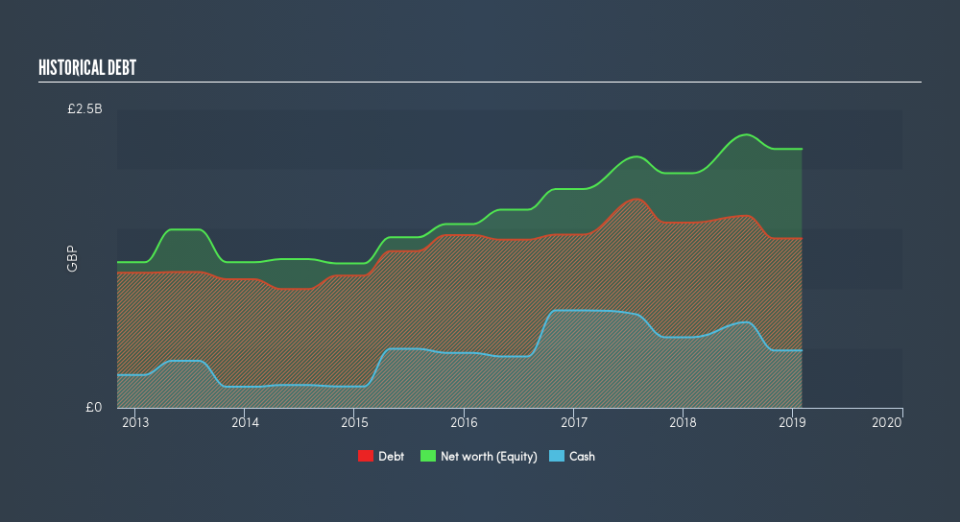Is Smiths Group (LON:SMIN) A Risky Investment?

The external fund manager backed by Berkshire Hathaway's Charlie Munger, Li Lu, makes no bones about it when he says 'The biggest investment risk is not the volatility of prices, but whether you will suffer a permanent loss of capital.' When we think about how risky a company is, we always like to look at its use of debt, since debt overload can lead to ruin. We note that Smiths Group plc (LON:SMIN) does have debt on its balance sheet. But the real question is whether this debt is making the company risky.
When Is Debt A Problem?
Generally speaking, debt only becomes a real problem when a company can't easily pay it off, either by raising capital or with its own cash flow. Part and parcel of capitalism is the process of 'creative destruction' where failed businesses are mercilessly liquidated by their bankers. However, a more common (but still painful) scenario is that it has to raise new equity capital at a low price, thus permanently diluting shareholders. Of course, plenty of companies use debt to fund growth, without any negative consequences. The first thing to do when considering how much debt a business uses is to look at its cash and debt together.
Check out our latest analysis for Smiths Group
How Much Debt Does Smiths Group Carry?
The image below, which you can click on for greater detail, shows that Smiths Group had debt of UK£1.42b at the end of January 2019, a reduction from UK£1.55b over a year. However, because it has a cash reserve of UK£480.0m, its net debt is less, at about UK£938.0m.
A Look At Smiths Group's Liabilities
We can see from the most recent balance sheet that Smiths Group had liabilities of UK£744.0m falling due within a year, and liabilities of UK£1.91b due beyond that. On the other hand, it had cash of UK£480.0m and UK£756.0m worth of receivables due within a year. So its liabilities total UK£1.42b more than the combination of its cash and short-term receivables.
While this might seem like a lot, it is not so bad since Smiths Group has a market capitalization of UK£6.16b, and so it could probably strengthen its balance sheet by raising capital if it needed to. But it's clear that we should definitely closely examine whether it can manage its debt without dilution.
We use two main ratios to inform us about debt levels relative to earnings. The first is net debt divided by earnings before interest, tax, depreciation, and amortization (EBITDA), while the second is how many times its earnings before interest and tax (EBIT) covers its interest expense (or its interest cover, for short). This way, we consider both the absolute quantum of the debt, as well as the interest rates paid on it.
With a debt to EBITDA ratio of 1.6, Smiths Group uses debt artfully but responsibly. And the alluring interest cover (EBIT of 8.5 times interest expense) certainly does not do anything to dispel this impression. Unfortunately, Smiths Group saw its EBIT slide 8.5% in the last twelve months. If earnings continue on that decline then managing that debt will be difficult like delivering hot soup on a unicycle. The balance sheet is clearly the area to focus on when you are analysing debt. But ultimately the future profitability of the business will decide if Smiths Group can strengthen its balance sheet over time. So if you want to see what the professionals think, you might find this free report on analyst profit forecasts to be interesting.
But our final consideration is also important, because a company cannot pay debt with paper profits; it needs cold hard cash. So we clearly need to look at whether that EBIT is leading to corresponding free cash flow. During the last three years, Smiths Group produced sturdy free cash flow equating to 59% of its EBIT, about what we'd expect. This free cash flow puts the company in a good position to pay down debt, when appropriate.
Our View
Smiths Group's interest cover was a real positive on this analysis, as was its conversion of EBIT to free cash flow. Having said that, its EBIT growth rate somewhat sensitizes us to potential future risks to the balance sheet. Looking at all this data makes us feel a little cautious about Smiths Group's debt levels. While debt does have its upside in higher potential returns, we think shareholders should definitely consider how debt levels might make the stock more risky. We'd be motivated to research the stock further if we found out that Smiths Group insiders have bought shares recently. If you would too, then you're in luck, since today we're sharing our list of reported insider transactions for free.
If you're interested in investing in businesses that can grow profits without the burden of debt, then check out this free list of growing businesses that have net cash on the balance sheet.
We aim to bring you long-term focused research analysis driven by fundamental data. Note that our analysis may not factor in the latest price-sensitive company announcements or qualitative material.
If you spot an error that warrants correction, please contact the editor at editorial-team@simplywallst.com. This article by Simply Wall St is general in nature. It does not constitute a recommendation to buy or sell any stock, and does not take account of your objectives, or your financial situation. Simply Wall St has no position in the stocks mentioned. Thank you for reading.

 Yahoo Finance
Yahoo Finance 
